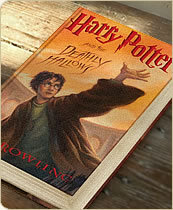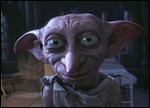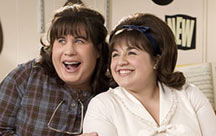 Spoiler alert: This review hints at some plot developments in Harry Potter Book Seven, but does not reveal who lives and who dies.
Spoiler alert: This review hints at some plot developments in Harry Potter Book Seven, but does not reveal who lives and who dies.
Reading “Harry Potter and the Deathly Hallows” changed my life and made me want to be a better person.
Seriously.
I now evaluate my deeds in light of the book, comparing my behavior to that of its characters. Am I willing to make sacrifices and suffer pain, like Neville? Am I willing to fight injustice, like Hermione? Do I, like Ron, stay true to my friends even when they seem clueless?
Like 72.1 million readers out there, I love the Harry Potter novels. But it took Book Seven to show me exactly why. It’s because dozens of characters in the books aren’t just fun to read about—they are Good people with a capital G, people I would want to get to know in real life, people I would trust. They aren’t tiresome moralizers, but they show with their deeds that they believe in battling evil, alleviating suffering, forgiving those who hurt them, and choosing others over themselves.
 The characters aren’t cookie-cutter ones: The light-hearted, jokey Fred Weasley is about as different from serious, squeaky, nervous Dobby as you can get. What nearly all of them share, however, is the wisdom to know what’s right and the courage to do it. “Deathly Hallows” is the book where we see that goodness burn brightest. It’s why, even though the novel drags in places and is occasionally marred by purple prose, it’s a wonderful book.
The characters aren’t cookie-cutter ones: The light-hearted, jokey Fred Weasley is about as different from serious, squeaky, nervous Dobby as you can get. What nearly all of them share, however, is the wisdom to know what’s right and the courage to do it. “Deathly Hallows” is the book where we see that goodness burn brightest. It’s why, even though the novel drags in places and is occasionally marred by purple prose, it’s a wonderful book.
Reviewers have praised the book’s made-for-the-big-screen action scenes and J.K. Rowling’s impressive ability to tie up loose ends into a plausible–nay, inevitable–conclusion. The true heart of the book, however, is the interaction between characters and the words they finally speak to each other. In one powerful scene, Ron exorcises the demons of jealousy and inferiority that have plagued his relationship with Harry. Harry’s faith in Dumbledore is tested severely, but vindicated. And Harry, at last, opens up to the people who love him, accepting their help and refusing to keep secrets from them.
The Harry Potter books aren’t religious, but a Catholic could tote up all the Works of Mercy that the Weasleys perform, from feeding the hungry to burying the dead. Jewish readers could say that the Harry Potter crew is, in essence, fulfilling the Tikkun Olam mandate by repairing the world. Buddhist readers could celebrate the detachment Dumbledore displays in the midst of chaos. And the image of a strong person deliberately making himself weak and defenseless to save those he loves–to free them from what binds them–will resonate with all Christians.
What’s most powerful in the books transcends religious categories. Love saved Harry when he was a baby, and love saves his world in the end. When love is strong enough, Voldemort’s destructive spells are weakened–they simply don’t last.
For J.K. Rowling, love is family. The fight to reconnect with family members, or keep families from separating, underpins much of the action. At the close of the novel, we see numerous families reunited: even the Malfoys are slightly redeemed, not because they reject evil outright, but because family is more important to them than Voldemort’s favors. Families who have lost a member grieve, but find moving ways to honor and remember their dead. As with Harry himself, the families who can accept loss are able to love most deeply and find peace in the end.


